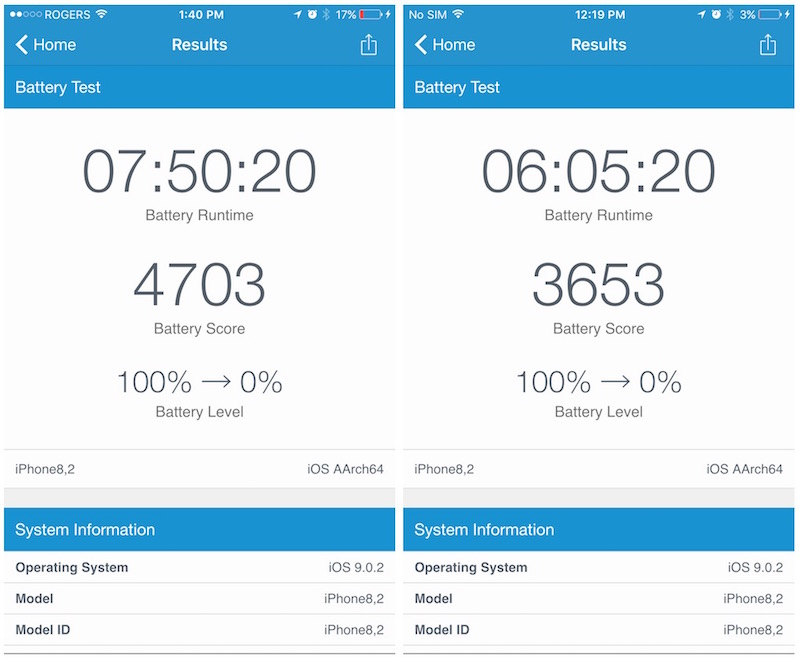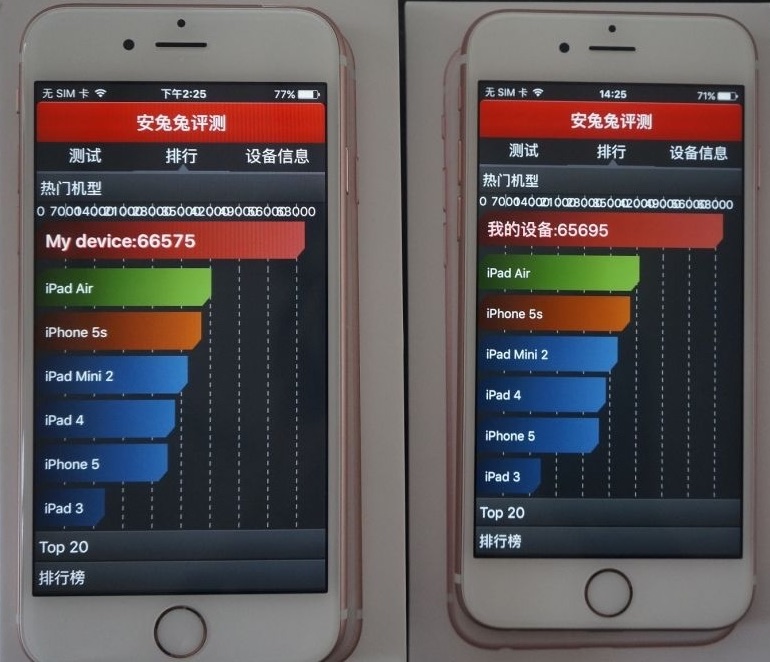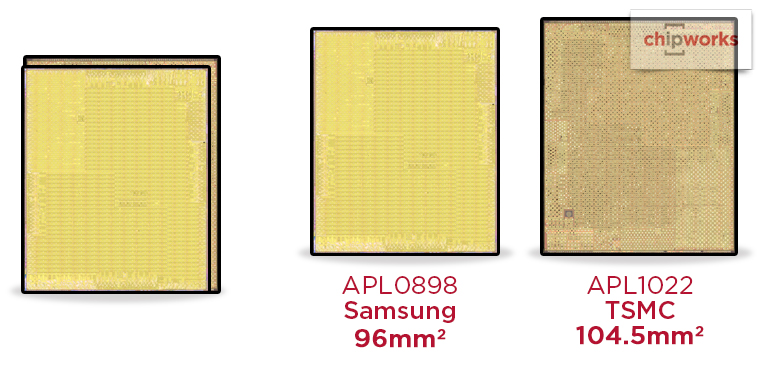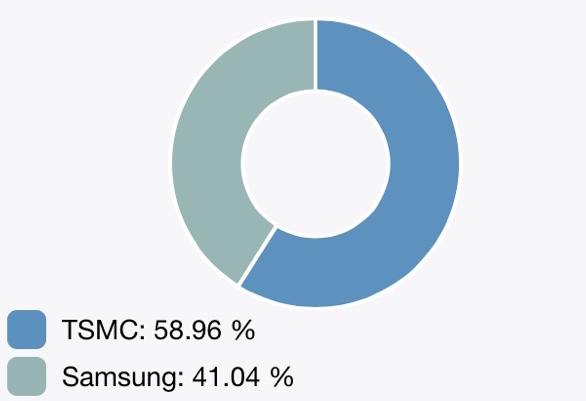Does your iPhone 6s or iPhone 6s Plus come outfitted with Samsung or TSMC-built A9 processor? The answer to that question could determine how long your device will run before its battery needs recharging.
Your key takeaway is this: while the dual-sourced chips perform identically in synthetic Geekbench tests in terms of sheer CPU compute power and GPU performance, there’s a marked difference in observed battery life ranging from six to eleven percent.
You could argue the difference is barely felt in day-to-day use, but I beg to differ: energy efficiency is paramount for mobile devices and the battery-friendlier the main processor is, the longer it will run on a single charge.
Battery benchmarks
Running battery benchmarks on the devices using PrimateLabs’ Geekbench app suggests about a two-hour difference in battery performance as handset models with the TSMC-manufactured A9 chip appear to be more power efficient than those using Samsung-built A9.
Pictured below: Geekbench battery tests on TSMC, at left, and Samsung iPhone 6s Plus variants, at right.
Tests performed by Reddit user “pw5a29”.
Both phones were tested using the same settings.
YouTuber Austin Evans ran a barrage of battery-straining tests and discovered some rather interesting results. He set the same brightness on both phones and left them running the GeekBench 3 battery test until they hit the 50 percent battery mark.
What Evans discovered was that the TSMC-built A9 lasted fifty minutes longer than the Samsung-built one, resulting in “a nearly 1.5 times difference in battery life”.
On the other hand, as Geekbench was designed to push the hardware to its limits these synthetic benchmarks tend to paint a not-so-accurate picture in terms of real-world applications.
YouTube tests
Evans then set out to highlight the differences between benchmarks and real-world usage by playing the same hour-long YouTube video on each device. The results may surprise you: he only observed a one percentage point difference in battery consumption between the Samsung and TSMC chips.
Time-lapse tests
Jonathan Morrison left Samsung and TSMC phones capturing a 30-minute Time-lapse. The TSMC model finished the task with 89 percent of juice remaining and the Samsugn model was down to 84 percent, a five point difference.
He then put both devices through their paces by having them export a ten-minute 4K footage in Apple’s iMovie application. This time around, the observed battery life difference was seven percentage points (TSMC: 62 percent battery; Samsung: 55 percent battery).
Morrison, too, had the same settings and brightness applied to both devices. The results prompted MacRumors to observe that while synthetic Geekbench tests revealed as high as a 22 percent difference in battery life between devices using the two chips, real-world impacts may be much smaller depending on the mix of activities.
“In these specific usage patterns shown above, battery life differences between the two processors ranged from six percent to eleven percent,” wrote the publication.
JavaScript and native video playback
Chinese outlet MyDrivers ran a series of benchmarks (Google Translate) testing the phones’ real-world performance in terms of JavaScript speed and the impact of native video playback on the battery.
Image of AnTuTu results via Reddit.
Again, the Samsung version depleted the battery faster than the phone running TSMC-built A9. All told, the Samsung chip consumed more battery, around twenty percent, in JavaScript tests.
When it comes to synthetic tests, after twelve runs of AnTuTu Benchmark, the TSMC iPhone 6s had 77 percent battery versus 71 percent charge for the Samsung model.
Samsung vs TSMC
The Samsung-built A9 system-on-a-chip (part number APL0898) inside the new phones is smaller than the one built by TSMC (part number APL1022).
Physically, the Samsung package is 96mm squared and the TSMC is is 104.5 mm squared, as per Chipworks’ analysis. This is the first time an Apple-designed mobile processor came in two different sizes.
In addition, Samsung’s A9 is built on the South Korean firm’s 14-nanometer process while the TSMC one is being fabbed on that company’s 16-nanometer process. Smaller process technologies yield smaller components and smaller die sizes, resulting in lower heat dissipation, faster performance and lower power consumption.
A9 manufacturing distribution data deriver from approximately 2,500 iPhones using an iOS app by developer Hiraku Wang.
“It was a surprise to find two different application processors in two otherwise identical phones,” said Chipworks, adding that the smaller die size “shows a leadership in technology scaling for Samsung.”
In terms of battery performance—not so much.
Apple disagrees
In a statement provided to TechCrunch, Apple had the following to say:
With the Apple-designed A9 chip in your iPhone 6s or iPhone 6s Plus, you are getting the most advanced smartphone chip in the world. Every chip we ship meets Apple’s highest standards for providing incredible performance and deliver great battery life, regardless of iPhone 6s capacity, color, or model.
Certain manufactured lab tests which run the processors with a continuous heavy workload until the battery depletes are not representative of real-world usage, since they spend an unrealistic amount of time at the highest CPU performance state. It’s a misleading way to measure real-world battery life. Our testing and customer data show the actual battery life of the iPhone 6s and iPhone 6s Plus, even taking into account variable component differences, vary within just 2-3% of each other.
Wrapping it up
The bottom line: even though Samsung uses a smaller process technology to build those chips, its 14-nanometer process is not as efficient in terms of power consumption as TSMC’s 16-nanometer process.
Both thermal imaging and AnTuTu Benchmark (available at no charge in the App Store) also showed the Samsung device running hotter than the TSMC version.
Other than that, the two chips produce essentially identical performance benchmarks so you shouldn’t notice any difference in terms of processing and graphics speed.
And what do you guys make of all this, aside from the fact that Samsung-built A9 is less power-friendly than its TSMC counterpart? After all, Apple’s marketing department doesn’t differentiate between these dual-sourced chips as both phones are rated with the same battery life.
From your vantage point, does the difference in observed battery life worry you or is it negligible to you in terms of real-life use?



